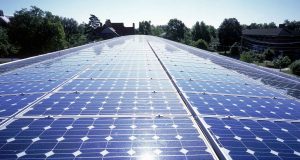The 5-billion euro Finnish energy systems provider, Wartsila, is looking to develop India as its biggest Asian market for battery storage solutions, given the huge potential from the country’s solar power play, as per a report by Economic Times.

India’s solar-power capacity has grown exponentially to around 14 gigawatts (GW) and the government has set an ambitious target of 100 GW by 2020, but storage has been a missing link thus far and the government is now acknowledging the need for it. Therefore, the government wants the industry to set up battery-manufacturing units in India as a sharp decline in prices of batteries between 2010 and 2017 has made battery-backed solar power more viable.
Javier Cavada, president and global head for Wartsila’s energy solutions business said that their company wants to develop India as our headquarters for battery-storage business in Asia. India has a huge potential for solar power and the government has taken up the biggest addition of solar power in the history of humankind. While India has a huge solar-power potential, this source of energy is intermittent and subject to fluctuations. The world over, solar power is supplemented with gas-based or hydropower to ensure continuous power supply. India does not have much gas, and hydropower project development in the country has been slow, leaving battery storage as a backup option.
So far, the high cost of storage was a discouraging factor for the price-sensitive market in India. But the fall in prices of the battery is making these projects more attractive. Cavada said solar units with battery storage may typically cost 20 percent more per megawatt than a project without it but they bring more efficiency in the long term and can reduce imbalances in the power sector.
With acquisition of Greensmith Energy Management Systems, a market leader in grid scale energy storage software and integrated solutions, Wartsila has emerged the biggest player for this solution. Experts believe the global energy storage market will be worth $60 billion by 2020, and Cavada says India will account for a sizeable share of this.




























